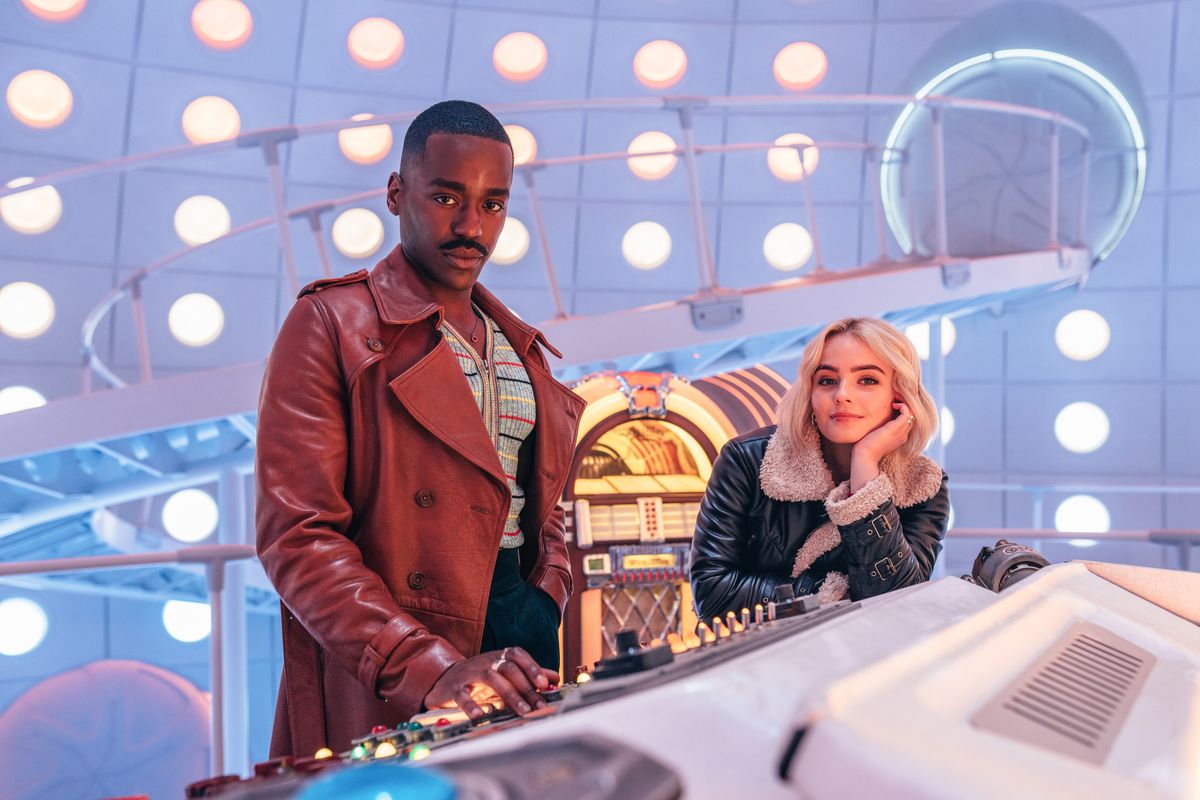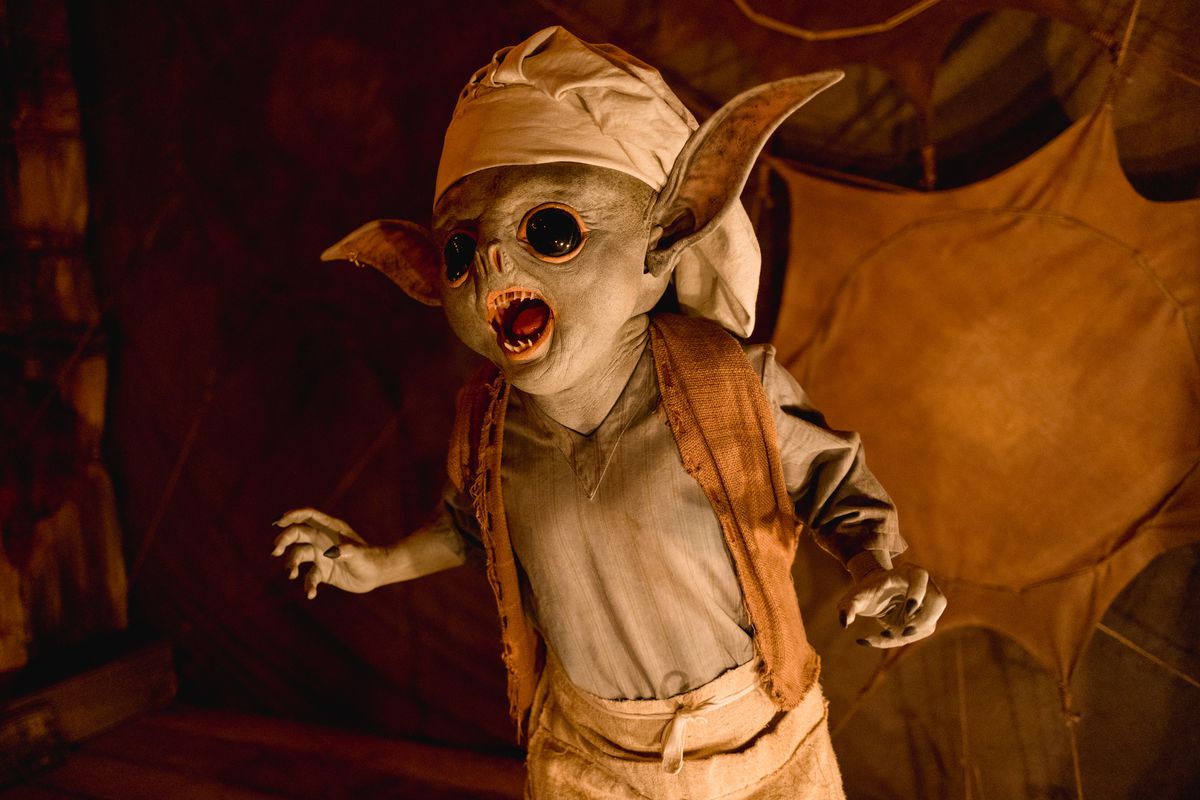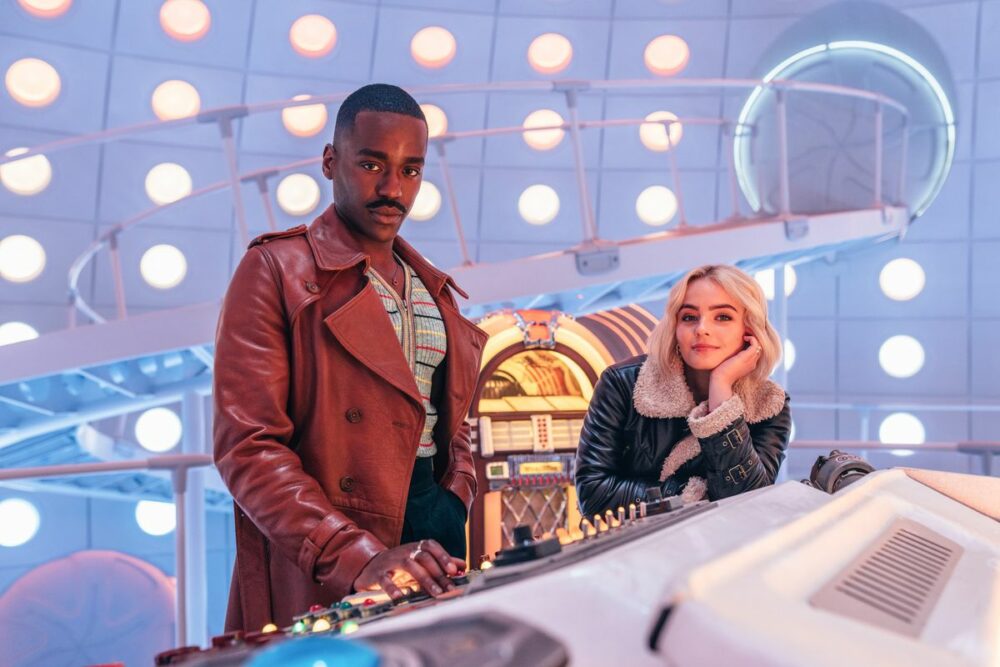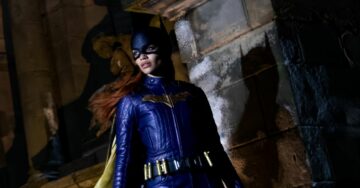There are few things on TV that feel as good as meeting a new Doctor and just knowing they’ll be terrific. Doctor Who’s 21st-century run has had plenty of ups and downs thus far, but casting the titular role has never been one of them. Ncuti Gatwa, the Fifteenth Doctor, is no different: immediately charming, charismatic, and odd. In his first full adventure, “The Church on Ruby Road,” Gatwa displays shades of Doctors who’ve come before while putting his own strong stamp on the role; simultaneously welcoming and enigmatic, he’s the kind of person you’d happily follow anywhere but is clearly not telling you everything.
And in “The Church on Ruby Road” we finally meet Fifteen’s companion for the forthcoming season: Ruby Sunday (Millie Gibson), an orphan who finds herself in a stretch of very bad luck. The ensuing episode is a perfectly nice holiday romp, the kind that will sell you on both this new Doctor and Ruby Sunday in no time at all, a feat so tricky you might forget how easy it is to mess up. Doctor Who is good at picking Doctors. The hard part is picking the companion.
Modern Doctor Who has put a lot of weight on the Doctor’s sidekick, often to the show’s detriment. The role is arguably more important for Doctor Who to get right than the lead — a good companion (or in some cases, companions) has to both be the audience surrogate and the grounding force for the Doctor. Before showrunner Russell T. Davies left Who for the first time in 2009, his then-final stretch of specials emphasized that bad things happen when the Doctor is alone, stewing in his centuries-old mind as he travels all of time and space and confronts the horrors therein.

Where Doctor Who has gotten into trouble in the past is when its writers decide to make its companion even more than this. Rose Tyler (Billie Piper) became a love interest for the Tenth Doctor (David Tennant), which you may take issue with or not (I personally believe the Doctor-companion relationship should always be platonic, but flirting is fine). Martha Jones (Freema Agyeman) nearly had her tenure as companion ruined thanks to the decision to make her smitten with the Doctor, forever unrequited because she wasn’t Rose.
The worst mistake Doctor Who’s writers can make with a companion, however, is when they make them a puzzle for the Doctor to solve. This was the highlight of the Steven Moffat era of Who, where long-running plots about “The Girl Who Waited” (Karen Gillan as Amy Pond) or “The Impossible Girl” (Jenna Coleman as Clara Oswald). Again: It’s hard enough being the companion. Also making them a plot device? That’s a lot!
“The Church on Ruby Road” seems like it’s going to go in this direction, as Ruby Sunday appears to be the nexus of multiple unnatural coincidences that pile one on top of each other as the special goes on. Thankfully, Davies side-steps that notion, simply using it as the means to introduce the monster of this episode: little baby-eating goblins that navigate the universe based on coincidence and also love to sing.

It’s in that sort of predicament that the audience gets to know what kind of companion Ruby Sunday will be: a young woman who is game to match the Doctor beat for beat in whatever it takes to get out of an outlandish situation, even if it means singing and dancing in front of some baby-eating goblins. Ruby Sunday is an orphan who wishes she knew more about her past, but isn’t scared to run toward the future — one that includes a time-traveling alien who loves an adventure and desperately needs the company. It sounds like the start of a fairy tale.
Which, put simply, is what Doctor Who feels like at its very best.
- SEO Powered Content & PR Distribution. Get Amplified Today.
- PlatoData.Network Vertical Generative Ai. Empower Yourself. Access Here.
- PlatoAiStream. Web3 Intelligence. Knowledge Amplified. Access Here.
- PlatoESG. Carbon, CleanTech, Energy, Environment, Solar, Waste Management. Access Here.
- PlatoHealth. Biotech and Clinical Trials Intelligence. Access Here.
- Source: https://www.polygon.com/reviews/24016644/doctor-who-christmas-special-review
- 2000
- a
- About
- Adventure
- again
- alien
- All
- alone
- also
- always
- amy
- an
- and
- anywhere
- appears
- ARE
- arguably
- as
- At
- audience
- bad
- based
- BE
- beat
- became
- because
- been
- before
- being
- believe
- BEST
- Billie
- both
- but
- CAN
- cases
- casting
- charismatic
- Christmas
- church
- clearly
- close
- coincidence
- come
- companion
- companions
- company
- Console
- controls
- dancing
- David
- decide
- decision
- desperately
- device
- different
- direction
- Disney
- displays
- Doctor
- Doctors
- downs
- each
- easy
- emphasized
- enough
- episode
- even
- everything
- far
- feat
- feel
- feels
- few
- Finally
- finds
- fine
- First
- first time
- follow
- For
- force
- forever
- forthcoming
- from
- front
- full
- future
- game
- Gaming
- Get
- gets
- go
- goes
- going
- good
- had
- happen
- Hard
- has
- he
- her
- Highlight
- his
- holiday
- How
- however
- HTTPS
- i
- if
- image
- immediately
- important
- impossible
- in
- includes
- interest
- into
- introduce
- Is
- issue
- IT
- ITS
- jones
- just
- karen
- kind
- know
- knowing
- lead
- left
- like
- Little
- lot
- love
- loves
- Luck
- make
- Match
- May
- means
- meet
- Meeting
- might
- mind
- more
- multiple
- navigate
- nearly
- needs
- never
- New
- nexus
- Nice
- no
- not
- Notion
- Odd
- of
- often
- on
- One
- or
- Other
- out
- own
- part
- Past
- perfectly
- person
- personally
- picking
- plato
- plato data intelligence
- platodata
- platogaming
- Polygon
- poses
- put
- putting
- Puzzle
- relationship
- right
- role
- ROSE
- Run
- scared
- season
- sell
- she
- should
- Simply
- simultaneously
- situation
- So
- SOLVE
- some
- Space
- special
- specials
- stamp
- start
- steven
- strong
- sunday
- Take
- takes
- tale
- telling
- than
- thanks
- that
- The
- The Future
- Them
- they
- things
- this
- Thus
- time
- to
- top
- toward
- tv
- tyler
- universe
- up
- UPS
- using
- very
- was
- we
- welcoming
- What
- whatever
- when
- where
- while
- WHO
- will
- with
- woman
- worst
- writers
- you
- young
- zephyrnet












